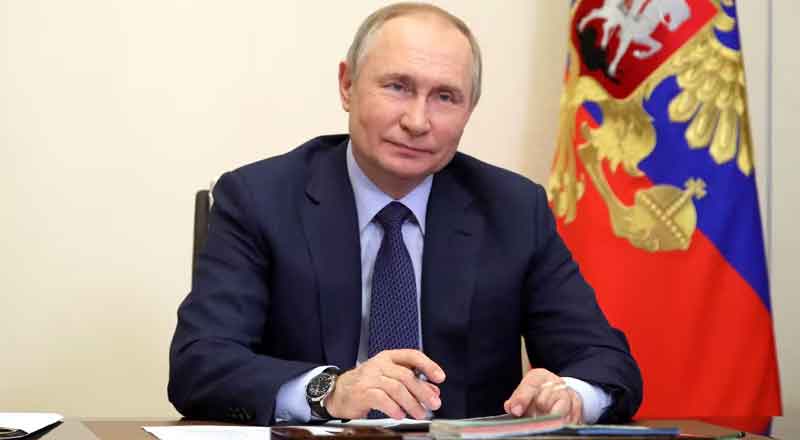- Vladimir Putin commenced his fifth term as President of Russia, solidifying his grip on power through a combination of geopolitical maneuvers and domestic consolidation.
- However, the Western world’s conspicuous absence at the Kremlin ceremony underscored the deepening divide over Putin’s leadership.
- The inauguration, held amidst heightened tensions with Western nations, saw notable absences, with the United States, European Union members, and other allied nations opting to boycott the event.
- His tenure has witnessed a transformation of Russia from post-Soviet turbulence to a formidable yet contentious global player, marked by bold assertiveness and tensions with the West.
- As Putin embarks on his fifth term, speculation looms over his agenda, both domestically and internationally.
- Analysts anticipate potential tax hikes and military recruitment drives to sustain Russia’s war efforts, signaling a departure from earlier economic objectives.
- Putin’s enduring popularity within Russia, bolstered by a narrative of patriotism and resilience, remains a formidable force despite international criticism and internal dissent.
Amidst grandeur and controversy, Vladimir Putin commenced his fifth term as President of Russia, solidifying his grip on power through a combination of geopolitical maneuvers and domestic consolidation. However, the Western world’s conspicuous absence at the Kremlin ceremony underscored the deepening divide over Putin’s leadership, particularly in the aftermath of Russia’s devastating incursion into Ukraine.
Having helmed Russia for nearly a quarter-century, Putin’s enduring presidency extends until 2030, a testament to his enduring influence within the country’s political landscape. His tenure has witnessed a transformation of Russia from post-Soviet turbulence to a formidable yet contentious global player, marked by bold assertiveness and simmering tensions with the West.
The inauguration, held amidst heightened tensions with Western nations, saw notable absences, with the United States, European Union members, and other allied nations opting to boycott the event. This diplomatic snub reflects the persistent discord over Putin’s actions, particularly his orchestration of the conflict in Ukraine, which has triggered widespread condemnation and punitive measures from the international community.
While Western powers refrained from attending the ceremony, France and a handful of EU states opted for diplomatic engagement, highlighting the nuanced approaches adopted by different nations in their dealings with Russia. However, Ukraine vehemently rejected the legitimacy of Putin’s presidency, further exacerbating the diplomatic rift between Moscow and Kyiv.
As Putin embarks on his fifth term, speculation looms over his agenda, both domestically and internationally. His ambitions to fortify Russia’s position on the global stage, coupled with his assertive stance on security matters, pose significant implications for regional stability and geopolitical dynamics.
Economically, Putin’s vision of propelling Russia into the top five global economies has been overshadowed by the exigencies of war, prompting a shift towards militarization and heightened defense expenditure. Analysts anticipate potential tax hikes and military recruitment drives to sustain Russia’s war efforts, signaling a departure from earlier economic objectives.
Amidst internal challenges, scrutiny mounts on the Russian Defense Ministry, particularly in light of criticism over military conduct and allegations of corruption. While Defense Minister Sergei Shoigu has weathered internal dissent, recent developments, including the detention of high-ranking officials, underscore the fragility of Russia’s military apparatus amidst ongoing conflict.
Putin’s enduring popularity within Russia, bolstered by a narrative of patriotism and resilience, remains a formidable force despite international criticism and internal dissent. The Kremlin’s suppression of opposition voices, exemplified by the persecution of figures like Alexei Navalny, underscores Putin’s authoritarian grip on power and his ability to navigate domestic dissent.
The recent presidential elections, portrayed as a rallying point for Russian solidarity amid the conflict in Ukraine, reaffirm Putin’s political dominance and popular support. With Western efforts to aid Ukraine faltering, Putin’s victory emboldens his resolve to secure Russian interests in the region, even at the expense of escalating tensions with the West.
As Putin embarks on his fifth term, Russia stands at a crossroads, navigating the complexities of global geopolitics while grappling with internal challenges and external scrutiny. The diplomatic boycott of his inauguration underscores the widening fault lines in international relations, casting a shadow over the prospects for reconciliation and cooperation in an increasingly polarized world.
In this context, Putin’s leadership assumes heightened significance, as his decisions and actions reverberate not only within Russia but across the international arena. The trajectory of his presidency, shaped by geopolitical imperatives, domestic exigencies, and shifting global dynamics, will undoubtedly influence the course of world affairs in the years to come.
As the curtain rises on Putin’s fifth term, the world watches with bated breath, awaiting the unfolding of a new chapter in Russia’s tumultuous history and its implications for global stability and security.
(With inputs from agencies)





